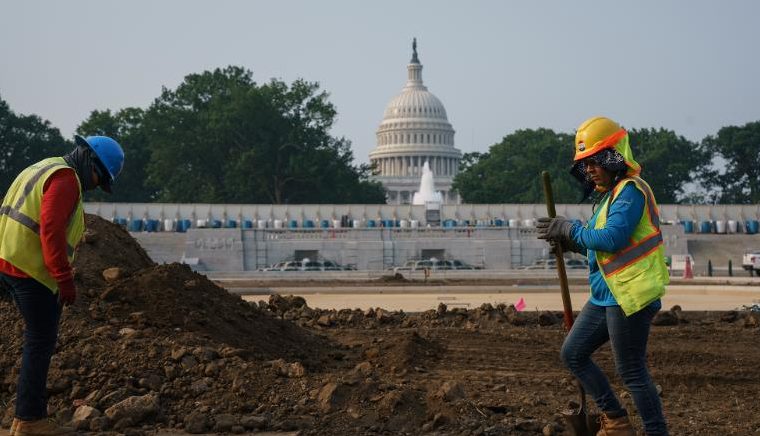The broad outlines set,
President Joe Biden’s $4 trillion
economic agenda now faces exhaustive, microscopic congressional scrutiny over its spending and finance particulars.
But its fate hinges on more visceral considerations. The new President’s ability to push his massive plans through the House and Senate will not turn on precise levels of new child care subsidies or Congressional Budget Office revenue projections.
“That’s window-dressing,” observed Ben Nelson, a former Democratic senator from Nebraska who has lived through comparable legislative slogs. “Terms rarely kill a deal. It boils down to the will.”
The will, that is, of decisive players to act on their convictions when political cross-winds grow fiercest. Details that emerge from painstaking closed-door haggling end up largely as justifications – or excuses.
Currently the spotlight shines brightest on 11 Republican senators whose votes Biden needs to overcome a filibuster of their $1.2 trillion compromise with Democrats on physical infrastructure. Their willingness to strike that bipartisan deal reflects the broad political appeal of upgrading America’s roads, bridges and broadband networks.
When final votes are cast, will that outweigh fear of attack from conservative constituents, colleagues and media outlets? The 11 have been wobbling — over potential revenue sources, and before that, Biden’s acknowledgment that their deal will smooth passage of a larger spending bill designed for passage with Democratic votes alone.
“Useful idiots for the Left,” Fox News anchor Laura Ingraham sneered at them on Twitter last week. When Senate Majority Leader Chuck Schumer moved to open debate on the deal, all 11 voted no.
But they haven’t abandoned cooperation yet. As negotiations continue, Schumer plans to hold another vote next week.
The deal will also test the resolve of Senate Minority Leader Mitch McConnell. Rallying his party for 2022 midterm elections, the Kentucky Republican has declared comprehensive opposition to the priorities of his former Senate colleague in the White House.
But roadblock opposition is riskier than it was when McConnell unified Republicans against the national health care plan of America’s first Black president a dozen years ago. Biden and his infrastructure agenda offer smaller political targets.
Few doubt McConnell could peel off enough Republicans to sink the package if determined to do so. Nelson, among other Democrats, expects him to try.
The GOP leader hasn’t signaled as much so far, however, instead expressing patience as talks drag on. One longtime adviser told CNN that McConnell will be loath to undercut the members of his conference involved.
Democratic challenges
Democratic progressives face their own gut check. Exuberant over regaining power this year, they want to pack the costlier Democrats-only bill with a major expansion of Medicare, immigration reform and perhaps even voting rights “infrastructure.”
Their test is maintaining the discipline to govern when the sweep of their plans hits the limits of Democratic unity. In a party that still includes a sprinkling of moderate-to-conservative members, they need near-unanimity to pass anything at all.
Some crucial voices, such as the self-described democratic socialist Bernie Sanders, have displayed pragmatism. After first calling for a $6 trillion Democrats-only package, Sanders quickly embraced the $3.5 trillion consensus advanced by party leaders.
Winning will require others to follow his example. House liberals blasting the bipartisan bill as inadequate would have to vote for it or risk knocking Biden off his legislative tightrope. The most conservative Democrats face similar cross-pressures.
Last November,
Sen. Joe Manchin’s West Virginia constituents backed former President Donald Trump over Biden by more than 30 percentage points. Efforts to combat climate change in the Democrats-only bill seek to hasten the demise of coal, a leading state industry, as an American energy source.
Yet West Virginia is among the poorest states. Subsidies for struggling families in Biden’s agenda would benefit its residents significantly.
Would Manchin sink Biden’s economic agenda to preserve his politically valuable reputation as a maverick? He didn’t on the President’s $1.9 trillion Covid relief bill, which also required all 50 Senate Democrats.
The White House and party leaders doubt he will on the two-part infrastructure package. But they can’t be certain.
In 2009, Nelson held the same clout as the Senate considered the Affordable Care Act. Then-President Barack Obama needed every single Democrat.
The Nebraska moderate, and other holdouts, forced concessions. But Obama ultimately won all their votes.
“Do you want half a loaf, or no loaf?” reasoned the former senator, author of a forthcoming book titled “Death of the Senate.”
The loaf that would become known as Obamacare emerged only because its namesake refused to stop pressing for a comprehensive national health care plan. Facing intense resistance, some Obama aides had suggested retreating to a smaller, more easily achievable goal.
The next few months will test Biden’s will to do the same. He hasn’t retreated yet.

